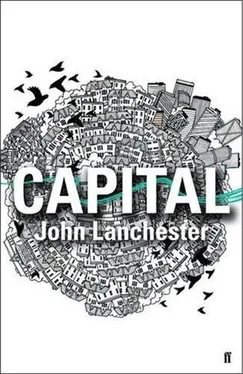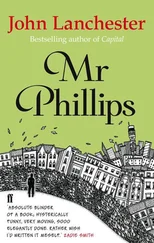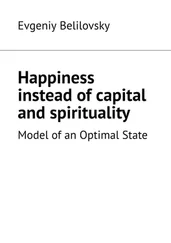Roger found that he hated everything about selling the house. He hated Travis, especially his voice – not his accent, he was used to all sorts of accents in the City, but his voice, which was flat, scratchy, affectless but wheedling. Most of all, he hated him for the fact that he felt entitled to have opinions and give advice – he announced that he was loving the way you’ve done the kitchen, praised the clever use of natural light in the sitting room, said there was something a little bit tired about Roger’s study but that that wasn’t such a bad thing given how nice the rest of the house was – it left them something to improve and gave it a bit of a blank canvas feeling. Travis was an avid fan of TV property programmes and felt at ease with the culture of wandering around other people’s houses and passing judgement on them.
As did most of the people who came to look at 51 Pepys Road – not that people said things out loud, except in the most egregious cases, but Roger could tell that they were thinking them, and that was bad enough. They looked, they snooped, they ogled, they judged. Roger could hear their little brains whirring. Why are they selling? Wonder why the husband’s around the house. Wonder where they’re moving to. Wonder what price they’ll accept. Wonder whether those pots are Lucie Rie. Snoop snoop whirr, went their little brains. Many, a significant minority, perhaps even a majority, were blatantly there to do nothing except sniff around the house out of vulgar curiosity. Travis claimed that he ‘weeded out the time-wasters’, but this was clearly not true, and when the obvious non-starters came to peek into his life, Roger struggled with the temptation to tell them right there on the doorstep to just fuck off. There was even a couple from down the street who came one day to poke around. They clearly hadn’t been expecting to be recognised by the owners. Travis was showing them around, but just to freak them out, Roger followed behind them, glaring, arms crossed, while the estate agent did his spiel. They were in and out of there in ten minutes flat.
‘Travis, those people already live in this street,’ Roger said, biting back something much ruder.
‘Oops, my bad,’ said Travis, clearly not thinking it any fault of his. ‘Some people, eh? Still, got a couple of good ’uns for you this afternoon.’
It was not that the house did not get offers. It did, immediately – meaning on the first day, from the very first people to look at it. Not that the offer was real, of course. Or rather it was real in the sense that its intention was sincere, but the money simply wasn’t there. These were people who would a. have to sell their own house for a lot more than they’d paid for it and b. have to arrange a gigantic mortgage before they were in a position to even think about offering for 51 Pepys Road – in fact they shouldn’t, given the realities of the situation, even have been looking. Travis, full of nonsense as he was in almost every respect, turned out to be surprisingly tough about the question of what offers to take seriously. No doubt because it bore on the question of whether he’d actually get paid his commission. ‘Don’t even think about them,’ he’d told Roger. ‘Unless the money’s real, it’s not worth it.’
Maybe they could actually afford it though… and that truly was a galling thought. Roger’s earlier, pre-Christmas-2006-bonus-fiasco, pre-sacking self was not far from being that person who could unthinkingly afford a £3.5 million house. That person felt as if he had died a long time ago; or rather like Roger’s long-lost and not much missed younger brother.
What Roger hated most about all this house fandango was that it was insane. No one could make a rational judgement about a decision of that size so quickly, after a twenty-minute viewing. But this air of madness seemed to be general. The whole process had a frenzy to it – everybody seemed in a rush, everybody was somehow heated up. It verged on the sexual. The thoughtful ones – the ones whose caution stood out, who were obviously more deliberate and grown-up – came and looked at the house twice for maybe a total of forty minutes. For the biggest financial decision they were ever likely to make in their lives – forty minutes. It all made Roger think about those postcards that said ‘We Want What You Have’. He’d like to track down whoever it was who sent them, jam the postcard into his mouth, and say, OK, fine, I’ll swap your life for mine, sight unseen – just to see the look on the little shit’s face.
Arabella, on the other hand, was rather enjoying the house being on the market. There was something very satisfying about the business of making the house nice as a way of adding to its value. Doing things to prettify the house was a sensible and practical necessity – it was a way of ‘maximising the value of their most important capital asset’, a phrase Arabella remembered from the time Roger had used it to justify pulling up the floorboards to put in new wiring for his home entertainment system. It went without saying that no house was perfect in and of itself. There were always little things to be done. Arabella bought a new bedside table and took the old one to the dump, and in her opinion made the bedroom much nicer, more saleable, just by doing that. Obviously she did that without telling Roger; equally obviously he didn’t notice. She longed – longed – to get rid of the Christmas sofa, a grey modern piece which looked lovely at the showroom but was just somehow wrong in their drawing room; but Roger would probably spot that change. Nothing could have irritated Roger more than seeing Arabella take a bizarre kind of pleasure in primping and tarting up the house prior to selling it. If her behaviour had been specifically designed to drive him round the bend – which in some moments was what Roger suspected – it couldn’t have been more perfectly calculated.
‘The plan is,’ Arabella said to Saskia over drinks in the bar at a restaurant where the bar was called The Library, ‘flog the house, move to Minchinhampton for a bit. That’s on the market too but it’ll take longer to sell – so we’re told, anyway. Then the plans diverge. Official plan, by which I mean Roger’s plan, is that we sell Minchinhampton too, take the money and go and look for a’ – she made quote marks with her fingers – ‘“small business opportunity” for Roger to set up shop then “do something real” by which he means… well, your guess is as good as mine. It has to be somewhere with good schools, primary anyway, and where the transport isn’t too much of a nightmare.’
‘Doesn’t sound too much like you. Green wellies with Chanel, Audi four-by-four on the gravel, flirting with the stable boy – I suppose I can see it, just about.’
‘Well, quite. The real plan, my plan, is, we go to the country, I get Minchinhampton looking nice, and take my time over it, and Roger gets enough of a chance to get the walking through the fields breathing fresh air out of his system, and realises he’s going to die of boredom, and all the guff about somewhere the children can run around is absolute crap because the country’s just as full of dangers as the town, more so, and then he notices that I’m so bored I’m about to run off with the Bikram Yoga teacher in the nearest market town, and he snaps out of it and by then all the Pinker Lloyd fuss has died down, and he sends out his CV and gets another proper job. None of this rubbish about moving to Ludlow to make widgets – a City job. Six-figure basic, seven-figure bonus in a good year. The way it’s supposed to be.’
Saskia gestured for two more lychee martinis. The waiter bowed and glided.
‘That sounds more sensible,’ she said.
‘Yes, and the good thing about this is that it’s made my parents wake up a bit. They always thought that because Roger did what he did and because we live like we do – correction, we lived like we did – we were made of money. They thought we were rich instead of your typical London struggling well-off. So they’ve woken up to the realities a bit, and the fantastic thing is, they’ve offered to pay the boys’ way through school – boarding school – we’re resolved on that. At least I am. So all we have to do is get them through to eleven, and then Mama and Papa will do all the rest – prep school first and then somewhere decent. It’s all a long way off but you do need a plan, don’t you?’
Читать дальше












